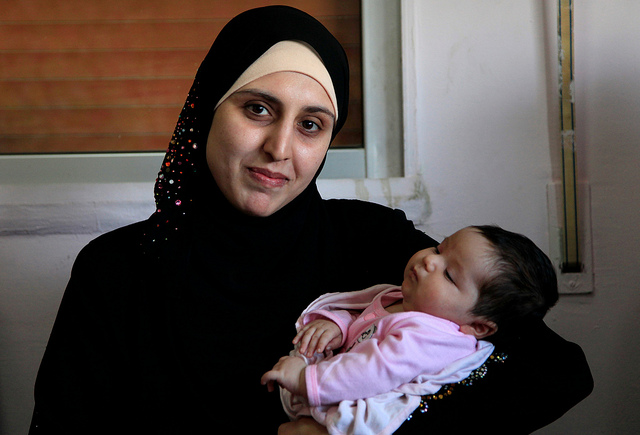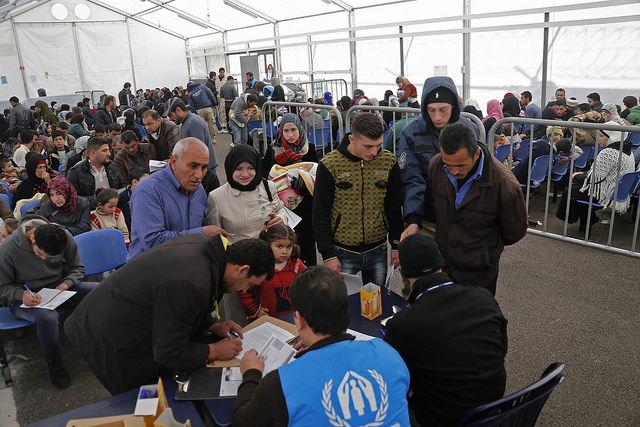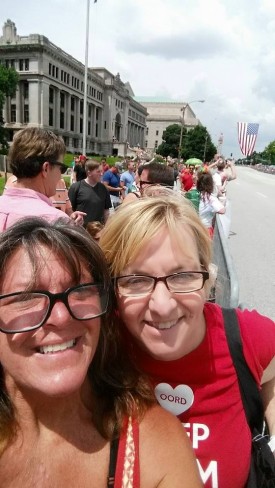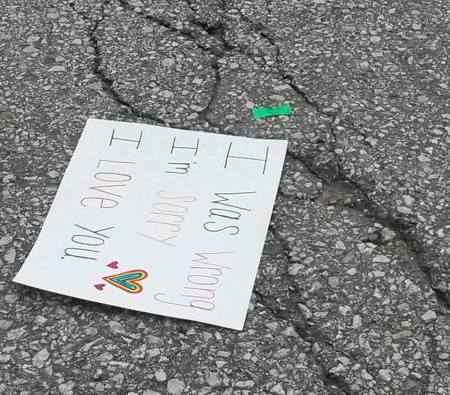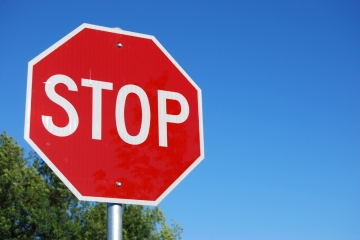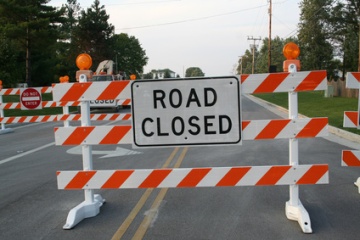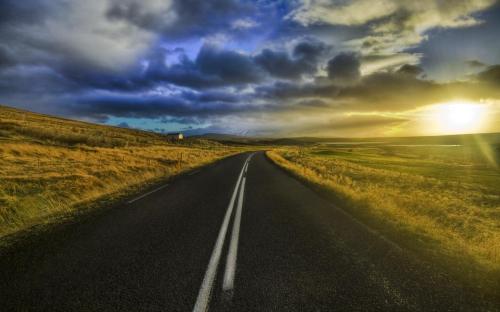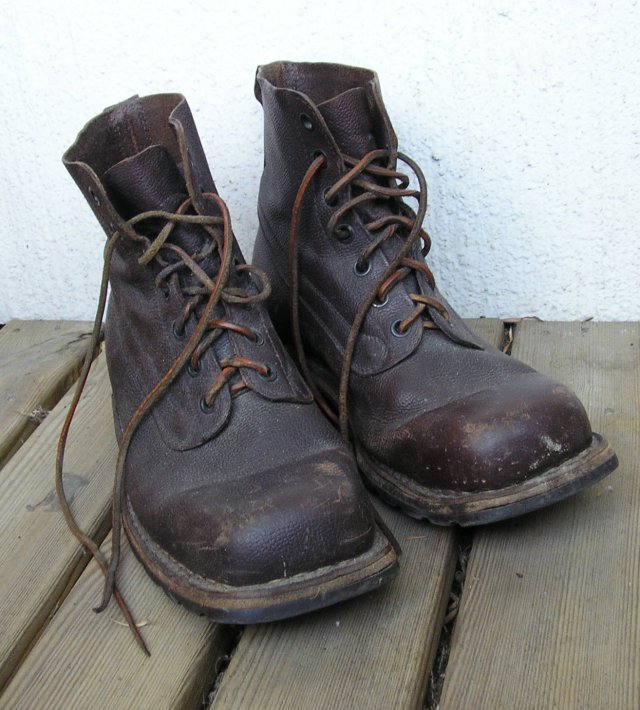
22 When the time came for the purification rites required by the Law of Moses,Joseph and Mary took him to Jerusalem to present him to the Lord 23 (as it is written in the Law of the Lord, “Every firstborn male is to be consecrated to the Lord”, 24 and to offer a sacrifice in keeping with what is said in the Law of the Lord: “a pair of doves or two young pigeons.”
25 Now there was a man in Jerusalem called Simeon, who was righteous and devout. He was waiting for the consolation of Israel, and the Holy Spirit was on him. 26 It had been revealed to him by the Holy Spirit that he would not die before he had seen the Lord’s Messiah. 27 Moved by the Spirit, he went into the temple courts. When the parents brought in the child Jesus to do for him what the custom of the Law required, 28 Simeon took him in his arms and praised God, saying:
29 “Sovereign Lord, as you have promised,
you may now dismiss your servant in peace.
30 For my eyes have seen your salvation,
31 which you have prepared in the sight of all nations:
32 a light for revelation to the Gentiles,
and the glory of your people Israel.”
33 The child’s father and mother marveled at what was said about him. 34 Then Simeon blessed them and said to Mary, his mother: “This child is destined to cause the falling and rising of many in Israel, and to be a sign that will be spoken against, 35 so that the thoughts of many hearts will be revealed. And a sword will pierce your own soul too.” Luke 2:22-35
We’re now, officially, in the Christmas season on the Christian calendar. As with Easter, we Christians don’t settle for just one day in which to remember and celebrate the highest and holiest events in our shared history: we get a whole season. But because of the way that we observe cultural Christmas – doing most of our shopping and decorating and singing and eating and partying in the lead up to Christmas, during Advent – by this point, December 27, most of us are done. Right? Some of us are ready to get that tree down today. Get it out of the way. Clean up the mess, stop singing those Christmas carols, move on. We’re sort of of hungover from Christmas.
That’s one reason that it’s a challenge to preach on the Sunday after Christmas.
But this year, for me at least, something else is at work. Our cultural Christmas – and indeed, much of our “Christian” Christmas, the way we observe this holiday in our churches – feels toothless. It feels disconnected from real life. What is this season about, anyway? If you ask the person on the street (who in America, statistically, is likely to identify as Christian) what Christmas means, what answer will you get? Family, generosity, being nicer to people than you usually are? Maybe if you ask for the “religious” version of the meaning you’ll get to a virgin, and a baby, and angels, and shepherds, and peace on earth, goodwill to men!
Can we admit that it sometimes feels like empty sentimentality, like we’re drumming up good feelings and talking about this story as if something dramatic and wonderful is happening – and yet it doesn’t feel like it connects to the world in which we live?
Perhaps the sentimentality is unavoidable in a story involving a baby. Because who doesn’t love a baby? They’re sweet and cuddly and adorable! But is the world really different, because of that baby?
We lit candles in the Advent season for hope, love, joy and peace. But do we have those things, really, because Jesus has come?
Three years ago, right in the middle of the Advent season, the Sandy Hook shooting happened and 26 people lost their lives – most of them young children. I imagine some of those families had nativities on display in their homes that December, celebrating the Prince of Peace, and then they lost their children to an act of violence. Last year, December 16, terrorists attacked a school in Peshwar, Pakistan and killed 148 people; almost all of them children. And as we know, it didn’t end there. In 2015, in Nigeria, Kenya, Yemen, Syria, Cameroon, Iraq, Egypt, Russia, and France – globally, terrorism took its toll. And here, too, we were not immune to horrifying acts of violence, in Charleston and Chatanooga, Roseburg, OR and Colorado Springs – and in San Bernardino…
And that’s only looking at 2015 through one filter. We’ve also been transfixed by the plight of millions of refugees seeking sanctuary, by continuing racial tension in this country, by our political candidates saying one terrible thing after another. That poison seemed to spread like a virus and from people that I know – Christians that I know, personally -I’ve heard the most appalling and hateful rhetoric directed at the poor, refugees, immigrants, liberals, conservatives; against sexual, ethnic and religious minorities. I have lived half a century of Christmases, and more than ever before I understand why, in the middle of the Civil War, Henry Wadsworth Longfellow wrote the words: “And in despair I bowed my head. There is no peace on earth, I said. For hate is strong and mocks the song of peace on earth, goodwill to men.”
If we see the birth of Christ as a sweet, sentimental lovely story about the birth of a baby who (theoretically) was supposed to make everything better and sort things out, this post-Advent season can seem almost embarrassing. It can feel like escapism, like waking from a dream. We sang, “O Come, O Come, Emmanuel” – and “Come, Thou Long Expected Jesus” – and he did, he came. The question is, what difference does it make?
And so we come to Simeon in the temple. Mary is following the law that requires her to be present herself for purification, with a sacrifice, forty days after the birth of a son. Mary and Joseph are actually going beyond the letter of the law in presenting their firstborn son to the Lord in the temple, perhaps echoing Hannah’s dedication of Samuel to the Lord’s service. And it’s here that they meet Simeon who has been waiting, and waiting, and waiting to see the Messiah. We know almost nothing about this man except that at some point he’s received a promise that he won’t die until it he has seen Israel’s Messiah – and now, at last, in this forty day old baby, Simeon is seeing the salvation of God. Simeon prayers this beautiful prayer of Thankgiving, which in Latin is often called the “Nunc Dimittis” – “Now Dismiss”. “Now, Lord, dismiss your servant….” or in other words, “You can let me die happy now, Lord.” But Simeon has something to say to Mary, too, and it’s not happy. Not sentimental. Not sweet.“This child is destined to cause the falling and rising of many in Israel, and to be a sign that will be spoken against, so that the thoughts of many hearts will be revealed. And a sword will pierce your own soul too.”
This is a warning. The coming of the Messiah will not be like flipping a switch and suddenly the world is right, and uncomplicated, and everyone loves each other and nothing bad is going to happen. No, Mary, this child is going to causing the rising and falling of many. He will be spoken against. He will expose people for who they really are. And you, Mary, are going to experience great pain as this child’s mother. Buckle up. It’s going to be a bumpy ride.
But I don’t think this surprised Mary. Do you remember her song, The Magnigicat? The song she sang after learning that she would give birth to the Messiah? There’s a reason that the theologian Scott McKnight nicknamed her Incendiary Mary. Listen to part of The Magnificat:
He has performed mighty deeds with his arm;
he has scattered those who are proud in their inmost thoughts.
He has brought down rulers from their thrones
but has lifted up the humble.
He has filled the hungry with good things
but has sent the rich away empty.
The Magnficat is a song of social upheaval – anticipating the upside down Kingdom that the Messiah will bring in which the proud, the powerful, and the well to do are brought low. And you know what? When the privileged are threatened they tend to resist, to fight back, to use their power to try to hold on to what they have. And so Simeon warns Mary. “Some will rise, others will fall, your son will make enemies, and it’s not going to be easy.”
Not sweet. Not sentimental. I don’t think Mary was a weak woman in any way, our portraits of her to the contrary. The incarnation required tough virtues, and I suspect that Mary’s strength of character is part of what qualified her for the job.
Over and over in the birth narratives we see how subversive this Messiah is, how much trouble he is going to stir up with the status quo. He is born in a situation that causes scandal – to a woman not yet married; to a couple who are virtually homeless, begging for shelter at the time of his birth. The angel army of God comes to announce the news of his arrival and they come to shepherds. SHEPHERDS! Shepherds were seen as dirty, disrespected outcasts in Judaism. They did the work no one else wanted to do, but everyone needed done (perhaps like many of our farm laborers today). and it’s to them that the angels appear. Can you imagine how offensive that idea must have been to religious leaders, that the angels of God would come to shepherds and not to the professionals?
The next worshippers that the narratives give us are the Magi. Gentiles! Pagans, probably!
And by the time that those Magi are traveling to see Jesus, this baby has already made his first political enemy, Herod, who rightly sees this infant as a threat and wants to kill him.
Any notion that we have that the birth of Jesus made everything sweet and lovely for either his family or his people, the Jews, is utterly destroyed by what happens next. After being warned in a dream, Jesus and his family flee from Herod and become political refugees in Egypt. Our Savior was a child refugee. But countless other little boys were unable to flee and died at the hands of those in power as Herod sought to kill Jesus. The slaughter of the innocents.
Matthew 2:18 says,“A voice is heard in Ramah, weeping and great mourning. Rachel weeping for her children and refusing to be comforted, because they are no more. “
I posted that scripture online after the Sandy Hook shooting, and again after the school shooting in Pakistan. In some ways it seems the world has changed so little. The powerful still do whatever they need to do to hold on to what they have, and the innocents still suffer. I thought of the passage again this year, looking at the photos of little Aylan Kurdi – the 3 year old refugee whose body washed up on a Greek beach, representing so many innocents whose names we will never know.
But of course, we know that the story did not end with Jesus as a child refugee. He survived, he grew up, left his home, and one day Jesus walked into that same temple in Jerusalem and read this passage from Isaiah:
“The Spirit of the Lord is on me,
because he has anointed me
to proclaim good news to the poor.
He has sent me to proclaim freedom for the prisoners
and recovery of sight for the blind,
to set the oppressed free,
to proclaim the year of the Lord’s favor.”
Then he rolled up the scroll, gave it back to the attendant and sat down. The eyes of everyone in the synagogue were fastened on him. 21 He began by saying to them, “Today this scripture is fulfilled in your hearing.”
And then Jesus went out and proved that he meant what he and said, and he did it right up until those in power killed him. Then, in the greatest plot twist in human history, Jesus conquered death itself.
Before ascending to his Father, Jesus told his followers to do what he had done. All of it. Bring the same good news to the poor, the captive, the oppressed, the blind. Live in the upside down kingdom that will comfort the afflicted and afflict the comfortable. Be despised, mocked, rejected, hunted – don’t be surprised if some of you get killed for my sake. But don’t worry, because I conquered my death, and I’ll conquer YOUR death, too. And lo, I am with you ALWAYS – even to the end of the age.
Friends, there is nothing sweet or sentimental about that, nothing that denies the ugliness of a fallen world. And yet that is the gift of the incarnation. The incarnation is Emmanuel, God-with-us. God-forever-with-us in the battle against sin, spiritual blindness, bondage, hatred, destruction and death itself. It is not a battle for the weak. It absolutely requires those Christmas virtues of hope, love, joy and peace – but radically redefined into something unbreakable. Hope born of our rock-solid conviction that what we see now is not all that is; that history is leading to the restoration of all that God created; love – even enemy love – that sees the image of God in everyone, that sees every person as worthy of the death Christ died for us. Love that is, as Dostoyevsky said, “labor and fortitude”. Joy that is rooted in being known and loved by God, in being sure that we belong to Him, in believing that even our suffering can be made into something beautiful by Him. And peace that is not simply something we possess but something that we struggle to give, to create in the world around us. “Blessed are the peacemakers, for they will be called the sons and daughters of God.”
In the world we live in, we need defiant hope, love, joy, and peace. We look straight into the face of the world’s evil and say, “I refuse to surrender to this. I will not be shaped by this but by the character of my king, the one who came for me. I will fight until my last breath to bring good news to all people.”
We are the citizens of a Kingdom that is now and not yet. It was established with the coming of the King; it will be fulfilled at his return – but in the meantime, we may feel sometimes that we live behind enemy lines (because we do), or that we are being asked to live upside down lives in comparison to the values of the world around us (because we are). And that’s hard. Not simply hard as in difficult (thought it can be), but hard as in firm, sturdy, unshakable…defiant.
As I prepared this sermon I asked the Lord to help me find an example of that sort of defiant love, or hope, or joy, or peace – a practical example from the world around me. There are many examples from Christian history, of course – of missionaries and martyrs; of those who fought against slavery, and for civil rights, who served widows and orphans. But something happened this past week, and I read about it in the news, and thought – this is a perfect example! Except for an ironic twist.
Many of you will have already heard this story. Somalia is the home to an extremist Islamist group called Al Shabbab. It was Al Shabbab that attacked Garissa University in Kenya, killing 147 people, specifically sorting out Christians from Muslim students and targeting the Christians for death. This is typical for Al Shabbab, and in fact, one strategy they use often is to cross the border from Somalia into Kenya and ambush buses traveling along the border – and then they will separate the Christian passengers from the Muslims, killing the Christians. In one incident, 36 passengers from one bus were killed. It’s so common that buses often have police escorts these days. But on this day, Dec. 21, the police escort had broken down and a bus kept going in this dangerous border region. Al Shabbab militants ambushed the bus, boarded it, and the militants attempted to separate the passengers into Christians and Muslims. But THIS time, the passengers didn’t comply. More notably, the Muslim passengers didn’t comply. Here’s a quote from one of the Muslim men who was on the bus: “We even gave some non-Muslims our religious attire to wear in the bus so that they would not be identified easily. We stuck together tightly,” Abdi said. “The militants threatened to shoot us, but we still refused and protected our brothers and sisters. Finally they gave up and left but warned that they would be back.”
Many of the Muslims on the bus were women who shared their hijabs with non-Muslims women. One of the women even reported saying to the militants, “Either kill us all, or leave us all alone.”
That is a demonstration of defiant love for neighbor – and a demonstration of practical peacemaking, of refusing to let the powerful write the rules for how the world will operate. Not on this day, not in this place, not on this bus.
And does it ruin the story that this act of neighbor love was performed by Muslims, and not Christians? I don’t think so. The story of God is full of unexpected people doing God’s work. From Ruth, to Rahab, to the Magi themselves and the Good Samaritan in Jesus’ parable. Remember that the Samaritans were considered idolatrous half-breeds by the Jews, and the Samaritan is the hero of that story. I think those Muslims gave us a beautiful example of God-inspired, tough-as-nails love. The kind of love that brought God himself into human skin to suffer and die for us. The kind of love that gave Mary and Joseph the courage to birth and nurture the Son of God in the face of scandal, homelessness, and persecution. The kind of love that Jesus said would mark his followers.
I think again of what that passenger on the bus said, “We stuck together tightly,” “The militants threatened to shoot us, but we still refused and protected our brothers and sisters. Finally they gave up and left but warned that they would be back.”
As we leave another Advent season and celebrate the coming of our king, that’s a pretty good description of how we can live. We stick together – not just Christians with Christians, Americans with Americans – but treating all of those created by God as worthy of our care, of our risk. We refuse the demands of a fallen world that we see only us & them, that we place protecting ourselves and what’s ours above the good of our neighbor. We refuse hopelessness, despair, hatred, bigotry, rage and fear. Until our King returns evil will always threaten, the powerful will always try to have their way – but we know that the baby in Bethlehem really did change everything. For starters, he blew the gates off the kingdom of God – that’s how we got it. He turned the world upside down, conquered death itself, and remains with us – God with us – God forever with us – through the Spirit who gives us strength to live tough-as-nails hope, love, joy and peace.
And so Longfellow, in the middle of the Civil War, could go on to write: “I heard the bells roll loud and deep, God is not dead nor doth he sleep. The wrong shall fail, the right prevail – with peace on earth, goodwill to men.”
The Lord has come, and the powerful won’t like it. The Lord has come, and it’s not going to be easy. The Lord has come, prepare to be tested. The Lord has come. Buckle up. Lace up your boots. Be strong, be courageous. You are soldiers of his Kingdom, sent to liberate a world that is still behind enemy lines.
Joy to the world, the Lord has come. May you live a defiant Christmas story.
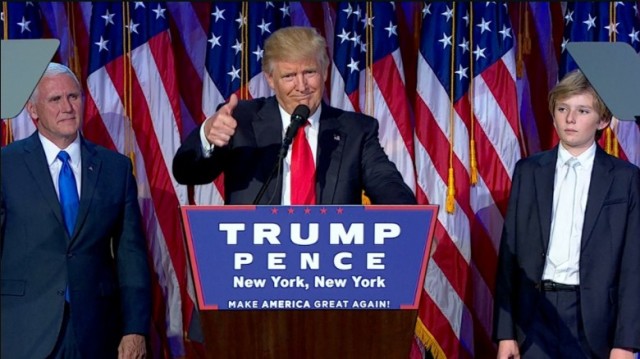 We are in Bizarro world now, where unless someone hands you a pamphlet entitled “I’m a White Nationalist: Ask Me How” you cannot suggest that they have troubling ties to white nationalism. I know that many people are enjoying this new climate, where all evidence is dismissed as leftist fear mongering, but some of us have to live in the real world where people that we love – I mean, not just people that you see on TV or that one guy in the IT department whose name you can’t remember – but people who are actually precious to us, are threatened by the climate that Trump helped to create.
We are in Bizarro world now, where unless someone hands you a pamphlet entitled “I’m a White Nationalist: Ask Me How” you cannot suggest that they have troubling ties to white nationalism. I know that many people are enjoying this new climate, where all evidence is dismissed as leftist fear mongering, but some of us have to live in the real world where people that we love – I mean, not just people that you see on TV or that one guy in the IT department whose name you can’t remember – but people who are actually precious to us, are threatened by the climate that Trump helped to create.
 I never blog anymore: I just rant on Facebook. But today I’m going to use this platform to share a few links about our newly anointed Republican nominee for president, in an attempt to consolidate my ranting. Then, of course, I’ll share this on Facebook.
I never blog anymore: I just rant on Facebook. But today I’m going to use this platform to share a few links about our newly anointed Republican nominee for president, in an attempt to consolidate my ranting. Then, of course, I’ll share this on Facebook.
 “You’re going to do what? Are you crazy?”
“You’re going to do what? Are you crazy?”
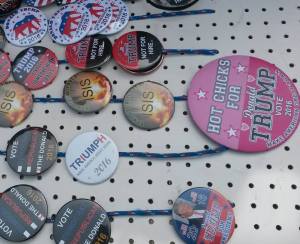 I heard the same answers over and over: “He’s an outsider.” “He says what he means.” “He believes what he says.” “He’s not an establishment politician.” Even my Bernie-loving friend said, “There’s no one in this room who can deny that Trump means what he says.”
I heard the same answers over and over: “He’s an outsider.” “He says what he means.” “He believes what he says.” “He’s not an establishment politician.” Even my Bernie-loving friend said, “There’s no one in this room who can deny that Trump means what he says.”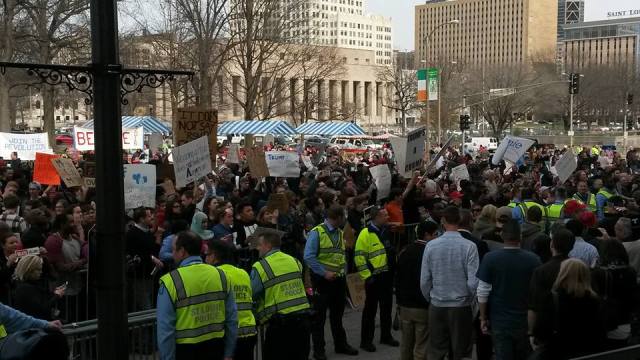 When I asked what issues mattered most, again there were common answers. The national debt. Trade policy. Rising healthcare costs. “Bringing jobs back to America.”
When I asked what issues mattered most, again there were common answers. The national debt. Trade policy. Rising healthcare costs. “Bringing jobs back to America.” And on it went. The subject of immigration in general seemed to bring up ugly ideas. Even refugees were talked about as just tools of the “global movement” (“They’re forcing them into these little towns to take the jobs.”) Lurid details of murders by immigrants were shared both from the stage and by those sitting near me.
And on it went. The subject of immigration in general seemed to bring up ugly ideas. Even refugees were talked about as just tools of the “global movement” (“They’re forcing them into these little towns to take the jobs.”) Lurid details of murders by immigrants were shared both from the stage and by those sitting near me.
